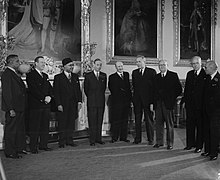| 4th Commonwealth Prime Ministers' Conference | |
|---|---|
 The Commonwealth prime ministers with King George VI at Buckingham Palace for the Conference, 1949 The Commonwealth prime ministers with King George VI at Buckingham Palace for the Conference, 1949 | |
| Host country | |
| Dates | 22–29 April 1949 |
| Cities | London |
| Participants | 8 |
| Chair | Clement Attlee (Prime Minister of the United Kingdom) |
| Follows | 1948 |
| Precedes | 1951 |
| Key points | |
| Dominion of India, London Declaration, Commonwealth citizenship, role of the Monarchy (King/Queen) (Head of the Commonwealth) | |
The 1949 Commonwealth Prime Ministers' Conference was the fourth meeting of the Heads of government of the Commonwealth of Nations. It was held in the United Kingdom in April 1949 and was hosted by that country's prime minister, Clement Attlee.
The principal topic of the conference was the relationship of India, which was intending to become a republic, to the Commonwealth, which, hitherto, had been an association of Britain and British dominions united by sharing a constitutional link by sharing the British sovereign as their head of state, in particular whether a Commonwealth state could become a republic and remain in the Commonwealth, if so, whether it had the same status in the Commonwealth as the dominions who had the British sovereign as their head of state. The Canadian government feared that if India was not permitted to remain in the Commonwealth as an autonomous republic then Pakistan, Ceylon, and South Africa would soon leave as well, resulting in the Commonwealth's collapse. Australian prime minister Ben Chifley was on one pole during the conference, arguing for maintaining a strong British connection, while South Africa's newly elected nationalist prime minister, D. F. Malan, was on the other pole arguing for complete independence.
In the London Declaration, Commonwealth prime ministers agreed to India's continued membership in the Commonwealth as a republic and that the King would have a new role in the Commonwealth not as a joint head of state but as "the symbol of the free association of its member nations, and as such Head of the Commonwealth."
Four days before the Conference met, Ireland formally declared itself a republic. The other members of the Commonwealth chose to regard that declaration as terminating Ireland's membership of the Commonwealth. Ireland had not participated in Commonwealth affairs since the 1930s but this was the first conference to be held after Ireland's membership was regarded as terminated.
Participants
References
- Rajan, Mannaraswamighala Sreeranga (1963). The post war transformation of the Commonwealth: reflections on the Asian-African contribution. Asia Pub. House. pp. 6–14.
- Banerji, Arun Kumar (1977). India and Britain, 1947-1968: the evolution of post-colonial relations. Minerva Associates. pp. 14–18. ISBN 978-0-88386-903-1.
- "Ireland leaves the Commonwealth, 1949". Royal Irish Academy. 18 April 2019. Retrieved 22 March 2021.
| Commonwealth Heads of Government Meetings | |
|---|---|
| Colonial and Imperial Conferences | |
| Commonwealth Prime Ministers' Conferences | |
| Heads of Government Meetings | |
This article about politics is a stub. You can help Misplaced Pages by expanding it. |
- Commonwealth Heads of Government Meetings
- Diplomatic conferences in the United Kingdom
- 20th-century diplomatic conferences
- 1949 in international relations
- 1949 in London
- United Kingdom and the Commonwealth of Nations
- 1949 conferences
- April 1949 events in the United Kingdom
- Clement Attlee
- Lester B. Pearson
- Jawaharlal Nehru
- Liaquat Ali Khan
- Politics stubs